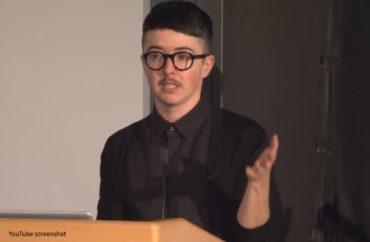
Blames ‘white supremacy and capitalism’ for society’s ills
“Wealth comes from intergenerational theft and trauma.”
“The United States is a war on indigenous people, it is a war on black people.”
“Wealth, happiness, joyful employment, weight loss, smooth skin and romantic partnership are all things that white supremacy and capitalism tell us to want.”
These are direct quotes from a lecture given in the spring at Boston University by Dean Spade, a trans-rights activist and associate professor at Seattle University School of Law.
Titled “How Social Movements Feel,” the special guest lecture was focused on “the social relations, conflicts, and emotional capacities” of activists engaged in efforts to “dismantle” and “reform,” according to an online description.
In the lecture, Spade directed the blame for most of America’s ills at “white supremacy and capitalism,” and criticized contemporary self-help literature as being ableist and too blaming.
The lecture, given as the eighth annual Eve Kosofsky Sedgwick Memorial Lecture in Gender and Sexuality Studies, also covered a range of issues from ableism to police brutality to class warfare.
Spade’s comments about self-help books were mostly critical, as he claimed that the books prioritize quick fixes over longer term, meaningful change. However, that wasn’t all. He also argued that the industry is affected by white supremacy and capitalism.
The event was hosted by Boston University’s Women’s, Gender, and Sexuality Studies Program. While it took place in late March, the talk was cited this month by some students at Boston University’s Kilachand Honors College as an example of an emphasis the honors college has begun to place on social justice over academics backed by data and sound reasoning.
It was not mandatory for Kilachand Honors College students to attend the talk, but was offered as an option for students seeking to meet its co-curricular semester requirements.
In an interview with The College Fix this month, one honors college student who attended the talk expressed discontentment with it, saying via email on the condition of anonymity “there are virtually countless examples of the lecturer saying unconventional if not questionable things. Also note how very few of the claims made by the speaker are substantiated with facts and evidence.”
Spade did not respond to a request for comment from The College Fix via a contact form on his website.
In his lecture, Spade urged the audience to be more accommodating of differing priorities, particularly concerning sex positivity. At the same time, striking a balance between sex positivity and views of relationships is important, he said.
“How can we be really into sex and as much promiscuity as everybody wants and lots of ways of relating, but also acknowledge that we treat people we have sex with and date worse than we treat anyone else,” he asked.
He also criticized incentives for employees to work out and be healthy.
“You can see it in policies that make employees or students at universities sign wellness contracts or gives financial incentives to people at work for not being fat, for doing yoga or meditation, all of this is kind of, like, very blaming and judging,” he said. “I think it’s also the logic that’s behind psychiatric imprisonment and the forced drugging of children and people in criminal punishment facilities.”
Spade started out the lecture by clarifying his views on what the American higher education system is built on.
“I just want to invite that to us and acknowledge that we are having this event together on stolen land and that these universities are institutions of settlers that are about settler knowledge,” he said.
Simply existing in the world is a struggle, he said he believes.
“It’s really hard to live with the amount of pain people experience from sexism, from racism,” he said.
“We can’t really handle that with the onslaught of bad news that we live in,” he explained. “You just go into a restaurant and you’re like, ‘who gets to eat here, who gets to work here?’ You walk through a plane, there’s a first class section. Every minute of living in the hierarchies.”
To change the system, simply being persuasive is not enough, he argued.
“There’s a liberal mythology that’s really strong in the United States that if we can just change people’s hearts and minds that can change the system,” he said. “I don’t believe that’s true because I don’t believe we live in a democracy.”
He turned to the example of police violence.
“The work that’s been done … to delegitimize policing in the United States and expose its racism is work through pressure,” he said. “It’s work through disruption.”
At the end of the lecture, Spade elaborated on how he shapes his own belief system.
“Imagining an end to prisons and borders which would require an end to the nation-state form as we currently have it helps me structure all my questions, all my curiosities, all my fantasies,” he said.
MORE: More Yale freshmen identify as LGBTQ than conservative
Like The College Fix on Facebook / Follow us on Twitter





Please join the conversation about our stories on Facebook, Twitter, Instagram, Reddit, MeWe, Rumble, Gab, Minds and Gettr.